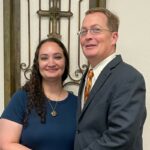THE FIRST WEEK
Genesis 1:1–5, 26–2:3
Genesis is not only the first book in the Bible, but the message of Genesis prepares a Bible reader to understand the rest of the biblical books. Genesis begins with a creation narrative and concludes with the descendants of Abraham in Egypt.
The Beginning (1:1-5)
Genesis 1 introduces the entire Bible by describing the nature of God and God’s relationship to the world. Genesis describes the beginning of the people of God through the lineage of the patriarch Abraham. Genesis provides the key to interpreting the entire Bible. The word “God” occurs 29 times in Genesis 1.
Verse 1 is a summary statement. God created the heavens and the earth — that is, all that exists.
The Hebrew term translated “create” is only used with God as the subject in the Bible. Humans can make, but humans cannot create out of nothing. God alone is eternal.
The remainder of the chapter describes the process of God’s creative acts in issuing 10 commands that bring order to the entire universe in six days. According to the Bible, the Trinity of God, Son and Spirit were involved in creation.
Verse 2 refers to the Spirit of God, and John 1:1–4 describes the Son as involved in creation.
On Day 1, God separated the light (day) from darkness (night).
The Image Bearers (26–31)
The creation of human beings was the climatic crown of God’s creative activity. Genesis emphasizes the high view of humans above other creatures by the phrase “let us make” rather than “let there be.” Adam and Eve, rather than other creatures, are created in the image of God. The animals came from the land: “Let the earth produce living creatures” (v. 24).
In contrast, God said, “Let us make man in our image, according to our likeness for the purpose of ruling the earth.” The phrase “let us” likely provides a hint of the Bible’s Trinitarian teaching. God created His image bearers as male and female and commanded them to produce offspring, fill the earth, subdue the earth and rule over other creatures.
God provided plants, trees, wildlife, birds and crawling creatures as food to the crown of his creation. After each day of creation, God pronounced it was good. However, on the sixth day, God said it was very good (v. 31).
The Rest (2:1–3)
In the creation account described in Genesis, the seventh day is different from the other six days. God does not create on the seventh day. God blessed the seventh day and declared the seventh day to be holy, set apart and consecrated for God.
Jesus habitually observed the Sabbath as a day of worship (see Luke 4:16). If Jesus followed the pattern of a day of rest and worship, should not we as created beings also observe a day of rest?
Both the Father and Son set an example of a Sabbath rest for His people to follow. Followers of Christ worshipped on the first day of the week to celebrate the resurrection (see Matt. 28:1, Mark 16:2, Luke 24:1, John 20:1, Acts 20:7 and 1 Cor. 16:2).
By Mark Rathel
Professor at the Baptist College of Florida in Graceville, Florida








